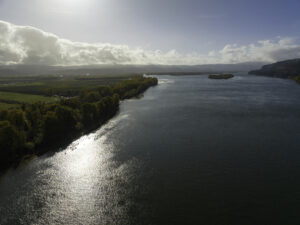Columbia Riverkeeper works with people in dozens of communities—from rural to urban—who share the same goals: Protect the health of their families and the places they love.
Victories
Your support leads to epic victories for clean water, salmon, and our climate. Take a look at our ongoing efforts to protect river communities.
- Victory: Army Corps Permit Required for Refinery’s Levee Impacts
 NEXT Renewable Fuels, Inc. needs a major federal permit for its proposed impacts to the Port Westward levee Read more
NEXT Renewable Fuels, Inc. needs a major federal permit for its proposed impacts to the Port Westward levee Read more - Tribes and Fish Advocates Win Legal Case Against Salmon Trucking
 Oregon Court of Appeals sides with Tribes and fish advocates, restores protections for salmon Read more
Oregon Court of Appeals sides with Tribes and fish advocates, restores protections for salmon Read more - Zenith Energy’s Legacy of Violations and Lies
 We know Zenith Energy has a history of violations and misleading regulators. So we decided to answer the question: just how many violations has Zenith committed? Read more
We know Zenith Energy has a history of violations and misleading regulators. So we decided to answer the question: just how many violations has Zenith committed? Read more
Case Studies
Get a closer look at how we inspire others to take action in their communities, and how action leads to big wins.
- Case Study: Portland Clean Energy Initiative
 Columbia Riverkeeper works with people in dozens of communities—from rural to urban—who share the same goals: Protect the health of their families and the places they love. Read more
Columbia Riverkeeper works with people in dozens of communities—from rural to urban—who share the same goals: Protect the health of their families and the places they love. Read more - Inspiring Action: Case Studies
 How can we inspire people to take action in their community? Our bread-and-butter play, is providing opportunities for people to come together and be part of something bigger. Read more
How can we inspire people to take action in their community? Our bread-and-butter play, is providing opportunities for people to come together and be part of something bigger. Read more - Case Study: Fossil Fuel Terminal
 Columbia Riverkeeper works with people in dozens of communities—from rural to urban—who share the same goals: Protect the health of their families and the places they love. Read more
Columbia Riverkeeper works with people in dozens of communities—from rural to urban—who share the same goals: Protect the health of their families and the places they love. Read more







